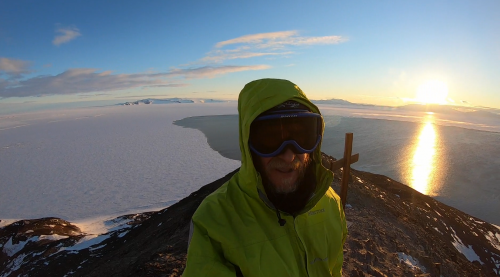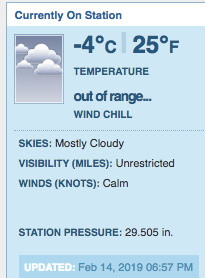Happy Valentine's Day to my beautiful wife
 Happy Valentine's Day to my beautiful wife. What an awesome family!
Happy Valentine's Day to my beautiful wife. What an awesome family!
Here is a video I made for Valentine's Day for my wife. It was a beautiful mid-night climb of Observation Hill to wish her a happy Valentine's Day. Beautiful scenery! Check this out:
 A midnight Valentine's Day sunset climb of Observation Hill.
A midnight Valentine's Day sunset climb of Observation Hill.
Weather

Menu

Questions from the viewers
I have received a few questions from some of you lately. They are such good questions. In fact, so good, that we will discuss them right her, right now.
Q: What about the animal life there, both in the water and in the Dry Valleys where you study?
A: There are many different players in the ocean ecosystems here. There are the producers who get their energy from the Sun. They get eaten by the small organisms there. A small shrimp-like animal called krill are an important animal at this level. They eat the phytoplankton and then the krill are eaten by larger animals like the penguin, fish, and some species of whales. Then come the "Grizzlies of Antarctica", the leopard seals. They, and the killer whales sit at the top of the food chain. The food webs from the Dry Valleys are much less complex. There are the cyanobacteria which converts energy from the Sun. They then get eaten by the small animals we are finding in the cold, dry soil. Those animals are nematodes, tardigrades, and rotifers. All animals about 1mm in size or less. Some of these small animals are also predators eating other small animals. That is about it for the Dry Valleys. Very simple food web. That's what makes these Dry Valleys such great labs to conduct environmental research. No plants to mess up the experiments here.
Q: Is there international cooperation or animosity between bases on the continent?
A: Absolutely no animosity! Total cooperation here. Every scientist on this continent shares anything that could benefit the progress of science here. Just today, in our station, I have seen New Zealand, Italian, and Chinese scientists cruising around enjoying themselves. "Scientists are Lovers, Not Fighters." (Dr. Byron Adams)
Q: Are there any security issues or is it a crime-free society there?
A: No security issues here. There are no police here. No law enforcement. No need. Everyone takes care of each other. We all know that a little mess-up and you're on the next plane headed home. There have been background checks to get here. These are the top scientists and the most talented workers in their field of expertise the country has to offer. I had a thought today as I was driving one of the trucks around today: I shouldn't leave the keys in the truck, someone might steal it. Then I remembered where I was. Where would a thief take it? I laughed at myself. If anyone can figure out the secret of how 1000 folks can be thrown into a little town like this, with absolutely no crime, and move that type of community into the U.S., I would want to live there for sure. It's been like a dream where everyone is nice. Everyone opens doors for you, they all say "hi" and "thank you". Everyone here is just as important as the next guy / gal, and we treat each other just like that. I don't know how it's done, but it is great to be a part of.
Q: What kind of weather will cancel a flight in or out of the station?
A: Low visibility. If skies are not clear, the clouds and the runway (which is an ice runway on the Ross Ice Shelf) blend together visually and pilots can't tell where the runway is and where the sky is. They will turn around and fly back to New Zealand.
Q: Have I felt the weather / season change since I've been here?
A: I left home in December. It is now the middle of February. Yes, for sure on the change of seasons. I got here in the height of the Antarctic summer. The Sun was high and bright. Now, the Antarctic winter is knocking on the door. As you can see from my videos and photos from the start of this adventure and my current photos, the Sun is much lower. It is not as bright. The Sun is getting very close to the horizon. It is only a couple of weeks away from dipping below and creating the first sunset in many months.
Q: What can and what can't I do around penguins?
A: I can do whatever I want as long as I don't change the behavior of the wildlife here. I can take their picture, I can sing them a song, I can even stand on my head in front of them. But, as soon as I make them change their behavior, I'm too close or doing something wrong.
Q: What is the history of the continent?
A: Wow, if I started now, I would not be able to answer this question for years. Antarctica is rich in history. Discovery, exploration, science, etc. has been going big for over a hundred years. Check out my journal from yesterday where I tell about the fossil Glossopteris and how it leads us to believe that the southern continents were at one time all hooked together.
Q: Were there ever dinosaurs here?
A: Yes, fossils have been discovered. Again, review the last journal which discusses Gondwana and you'll see how these dino fossils got here.
Q: Have other animal fossils been found in Antarctica?
A: Yes. Dr. Byron Adams tells me that last year, while he was on the Shackleton Glacier, a scientist found an iguana-sized dinosaur. He referred me to this page to find more information. Check it out for sure!
Those were some great questions. Thanks for sending them, and as always...
If you have any comments or questions, please send to: kdickerson [at] alpinedistrict.org
Let's end today's journal entry with another video
Come join me on a beautiful, cold, windy (aren't they all) run around Observation Hill. This is called the Loop Trail. Beautiful ocean scenery. Check it out.


Comments
Add new comment